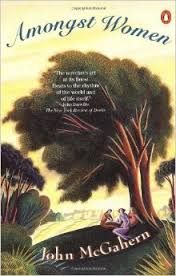Amongst Women  John McGahern
John McGahern
Faber & Faber 1990
This is the story of Moran, a widowed, ex-IRA officer, his new wife, his three daughters and two sons. It’s also the story of a time in recent Irish history that is increasingly seen as distant and strange. Moran is a man bitter and angry that the country for whose freedom he fought is now run by those that he regards as crooks and charlatans. A damaged and disappointed man, he takes out his sporadic anger on those around him. In the case of his sons, this is often a matter of physical violence. The elder son, Luke, is totally estranged from that family and lives in London. The new wife, Rose, keeps the peace as best she can as Moran’s resentments result in the thwarting of his daughters’ ambitions and the alienation of his second son, Michael. All the while Moran pontificates about the centrality of family life and the loyalty that he expects from those around him.
The story unfolds slowly and in a very measured way and as it progresses the simple view of Moran as tyrant goes through change and nuance.
In the author’s memoir, All Will Be Well, he speaks at the very opening of the book about the labyrinthine lanes criss-crossing the town-lands in his place of rearing. One of the oddities of these boreens is the peculiar way that a distant place seen from one vantage may appear vastly different further down the road. And so it is with the picture he paints of Moran. A man capable of charm and warmth when it suits him, he’s also a man who carries a great sadness around with him. And much like the experience of traveling those country lanes, he finds himself sometimes closer and sometimes farther from self-understanding.
It’s not a book with an involved plot — much of what happens is pretty predictable. And it’s not a book whose characters go through any great changes. Rather it’s a picture of certain forces and histories playing themselves out in a way that many of us — particularly those of us who have lived in Ireland in the ‘50s and ‘60s — will understand all the more clearly because of its telling.
This is something that I’ve noticed in Irish writers, this raking over the past. Roddy Doyle in the Henry trilogy deals with the Easter uprising of 1916 and continues (albeit not always in Ireland) through the 1950s. JG Farrell’s Troubles (reviewed in an earlier blog/newsletter) is set in 1921. William Trevor, Seamus Deane and many others have set works in earlier, pre-Celtic Tiger days. It’s understandable, of course. For a long time Ireland was an inward-looking country, repressed and sin-obsessed, with the Church ruling over all aspects of Irish life. This has left deep scars, I think, on the Irish psyche.
It’s evident, too, from this story that the character of Moran is based on McGahern’s own father — a man he describes as having “no sense of humour” — an authoritarian bully. The similarities are evident from reading his memoir, All Will Be Well. One small detail is that his Moran, like McGahern’s father, wears a brown suit for all formal occasions.
John McGahern’s sudden and untimely death in 2008 at the age of 71 was a shock. His illness was not common knowledge and his death was so sudden that he died on the day that he went into hospital. I remember in 2001 seeing a review and an excerpt in the Irish Times of his book, That They May Face the Rising Sun (published in the US as Beside the Lake). I had only been slightly aware of his work. I’d read some short stories and his book, The Pornographer, back in the ‘80s and had not been particularly moved. I had somehow missed Amongst Women all together despite its having been shortlisted for the Booker prize. The Irish Times review of That They May Face the Rising Sun was glowing and the excerpt I read really impressed me. The book, unfortunately, was not readily available here in the US so it was a couple of years before I managed to get my hands on a copy. Not long afterwards I became aware of Amongst Women.
It’s a slightly strange book. The style is knowing, the voice that of the omniscient narrator. The opening sentence draws you right in: “As he weakened, Moran began to be afraid of his daughters.” The style is simple, honed — even spare. "My only concern," McGahern once said, "is that I get the sentence right and describe my world clearly and deeply."
There’s an almost dispassionate tone that, despite the all-knowing teller, allows to arrive at one’s own conclusions — or lack of conclusions.
